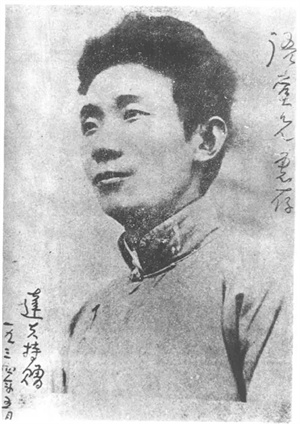
谈结婚
◎郁达夫
前些日子,林语堂先生似乎曾说过 〔14〕 女子的唯一事业,是在结婚。现在一位法国大文豪来沪,对去访问他的新闻记者的谈话之中,又似乎说,男子欲成事业,应该不要结婚。
华盛顿·欧文 〔15〕 是一个独身的男子,但《见闻短记》里的一篇歌颂妻子的文章 〔16〕 ,却写得那么的优美可爱。同样查而斯·兰姆 〔17〕 也是个独身的男子,而爱丽亚的《独身者的不平》 〔18〕 一篇,又冷嘲热讽,将结婚的男女和婚后必然的果子——小孩们——等,俏皮到了那一步田地。
究竟是结婚的好呢,还是不结婚的好?这问题似乎同先有鸡呢还是先有鸡蛋一样 〔19〕 ,常常有人提起,而也常常没有人解决过的问题 〔20〕 。照大体看来,想租房子的时候,是无眷莫问的,想做官的时候,又是朝里无裙 〔21〕 莫做官的,想写文章的时候,是独身者 〔22〕 不能写我的妻的,凡此种种似乎都是结婚的好。可是要想结婚,第一要有钱,第二要有闲,第三要有职,这潘驴 〔23〕 ……的五个条件,却也很不容易办到 〔24〕 。更何况结婚之后,“儿子自己要来” 〔25〕 ,在这世界人口过剩,经济恐慌,教育破产,世风不古的时候,万一不慎,同兰姆所说的一样,儿子们去上了断头台 〔26〕 ,那真是连祖宗三代的楣都要倒尽,那里还有什么“官人请!娘子请!”的唱随之乐 〔27〕 可说呢?
左思右想,总觉得结婚也不好的,不结婚也是不好的。
A Chat about Marriage
◎ Yu Dafu
The other day, Mr. Lin Yutang said something to the effect that women’s only career lies in matrimony. Now, an eminent French writer declared at a press interview after arriving in Shanghai that men should stay bachelors if they want to achieve success in life.
Washington Irving was a confirmed bachelor, but in his Sketch Book there is an article extolling the wife as a graceful and lovely life-long partner. Charles Lamb, also a single man, in A Bachelor’s Complaint of the Behaviour of Married People, one of his essays signed “Elia”, speaks mockingly of married people with their inevitable postnuptial fruits — the children.
Marriage or no marriage, which is more desirable? That sounds like the chicken-and-egg question, which, though often discussed, remains a perpetual puzzle. Generally speaking, one who has no family dependants is not supposed to rent a house, one who has no petticoat influence in the government should refrain from becoming an official, an unmarried male writer is in no position to write about “my wife”. All these seem to hint at the advantages of marriage. But, to get married, you need to have five prerequisites, namely, money, leisure, employment, good looks and potentness, of which all are not always available. What is more, after your marriage, your offspring will come to this world of themselves. And in a world with overpopulation, economic crisis, educational bankruptcy and deteriorating public morals, they may, just as Charles Lamb says, through their own acts of indiscretion, be sent to the gallows. With such a terrible misfortune befalling your family, how could you still have wedded bliss to speak of?
Thinking the matter over and over again, I cannot but come to the conclusion that neither matrimony nor bachelorship has anything to recommend itself.
郁达夫,一生短暂,在恋爱与婚姻上有很多坎坷经历。小品文《谈结婚》寥寥数语,看似游戏笔墨,但庄谐并出,寓理于趣,感叹人生多苦难,对现实百态深表不满。
注释
〔14〕 “似乎曾说过……”意即“说过一些话,大意是……”,译为said something to the effect that …,其中to the effect that…作“大意是……”解。
〔15〕 “华盛顿·欧文”是美国作家Washington Irving(1783—1859)。《见闻短记》(Sketch Book)为其著名代表作。
〔16〕 “一篇歌颂妻子的文章”的篇名为The Wife。
〔17〕 “查而斯·兰姆”是英国散文家Charles Lamb(1775—1834)。笔名爱丽亚(Elia),著有《爱丽亚散文集》(Essays of Elia)。
〔18〕 “《独身者的不平》”指《爱丽亚散文集》中的一篇,名为A Bachelor’s Complaint of the Behaviour of Married People。
〔19〕 “这问题似乎同先有鸡呢还是先有鸡蛋一样”译为That sounds like the chicken-and-egg question,其中chicken-and-egg(或chicken and egg)是成语,作“鸡与蛋孰先难定的”或“因果难定的”解。
〔20〕 “常常没有人解决过的问题”可译为has never been resolved,现译remains a perpetual puzzle,变反说为正说。
〔21〕 “裙”指“裙带关系”,意即“藉以相互依靠的姻亲关系”,现译为petticoat influence。
〔22〕 “独身者”指“独身男作家”,故译为An unmarried male writer。
〔23〕 “潘驴”源自《金瓶梅》第三回,指“潘安的貌”和“驴大行货”,在文中分别指第四、第五两个条件。现分别译为good looks和potentness。
〔24〕 “却也很不容易办到”意即“却也不容易都具备”,译为of which all are not always available,等于of which not all are always available。
〔25〕 “儿子自己要来”译为your offspring will come to this world of themselves,其中短语of themselves和automatically同义。
〔26〕 “上了断头台”,本可译为be sent to the guillotine,但因兰姆文中说的是绞刑架,故译为be sent to the gallows。
〔27〕 “‘官人请!娘子请!’的唱随之乐”不宜逐字直译,现意译为wedded bliss(闺房之乐),简单明了。
未经允许不得转载:帕布莉卡 » 郁达夫《谈结婚》 -经典散文英译-中英双语赏析
 帕布莉卡
帕布莉卡


 王蒙《宰 牛》
王蒙《宰 牛》  爱是一颗心遇到另一颗心(出处+配图)
爱是一颗心遇到另一颗心(出处+配图) 

